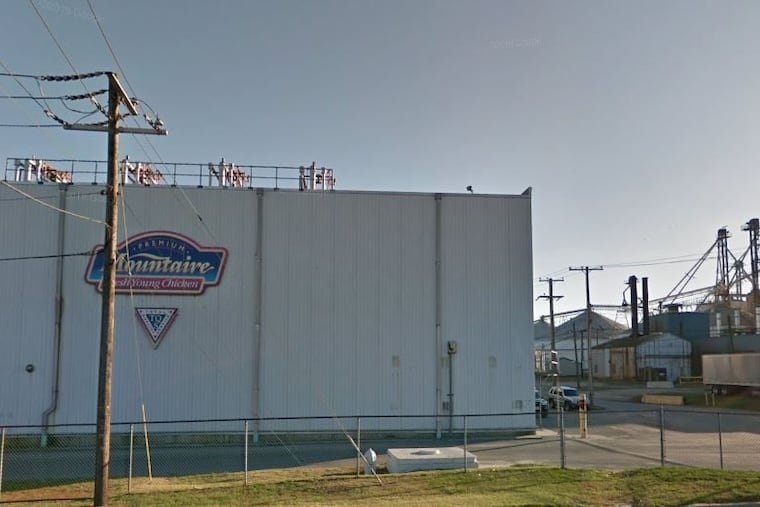Pollution settlements cost Delaware poultry producer $205 million
A large chicken producer has agreed to pay $205 million over claims its disposal of wastewater and sludge at a Delaware plant seeped into drinking water wells and polluted the air.

Two legal settlements will cost one of the largest chicken producers in the country $205 million over claims its Delaware plant disposed of wastewater and sludge that polluted nearby waterways, private water wells, and surrounding air, according to lawyers involved in the case.
A class-action settlement with Mountaire Corp. includes $65 million that will be put into a fund for residents whose properties were affected by the company’s Sussex County plant. In a separate action, the company will spend $140 million to upgrade its treatment system. The settlement is the result of two separate court actions. One was filed in Delaware Superior Court on behalf of residents, and the second was a civil suit filed in U.S. District Court by the Delaware Department of Natural Resources and Environmental Control (DNREC).
Lawyers representing residents whose wells or air were polluted announced the settlement of the state case on Monday, and said it triggered a consent decree in the federal case.
Resident Gary Cuppels, 74, who sued the company after he and his wife, Anne-Marie, were hospitalized for gastrointestinal issues in 2017, called the settlement “the best outcome possible” during a news conference, but said the couple are still plagued by painful conditions they say is the result of the contamination.
“There’s something in our gut that’s creating our issues,” said Cuppels, who owns a waterfront home he says has also been devalued.
The family-owned Mountaire Corp. says it is the sixth largest chicken company in the U.S., and also has facilities in Arkansas, Maryland, Virginia, and North Carolina.
The company’s Mountaire Farms plant in Millsboro, Del. is located along Swan Creek and the Indian River. There, Mountaire slaughters and processes about two million chickens a week, according to court documents. Instead of discharging the wastewater into the waterways, the company treats two million gallons of wastewater a day, in part, by sending it to lined lagoons and spraying it across 13 fields.
“While Mountaire does not believe that it caused any damage to any of the plaintiffs, it chose to settle the case in order to achieve a final resolution and to allow construction of a new wastewater treatment plant to proceed,” Phillip Plylar, president of Mountaire, said in a statement. “... We’re ready to put this chapter behind us and forge a new relationship with our neighbors moving forward.”
Belief that the Mountaire plant was affecting residents’ health began in 2017 when Cuppels and his wife were hospitalized. Later in the year, he came home one night and found two cases of bottled water on his front porch along with a letter from Mountaire instructing him not to use the water from his faucet.
The couple reached out to lawyers and were eventually represented in a class-action suit by Chase Brockstedt of Baird Mandalas Brockstedt, of Delaware, and Philip Federico of Schochor, Federico and Staton, of Maryland.
Meanwhile, Delaware environmental officials were separately negotiating an agreement in federal court with Mountaire over pollution issues.
In one of its federal court filings, DNREC said Mountaire Farms “grossly exceeded” its effluent limits in 2017, and in prior years. The state found that, in 2017, Mountaire applied approximately two million gallons of sludge to fields without submitting required documents to DNREC. The excessive sludge contributed to nitrate contamination of the groundwater, DNREC said in a court filing.
As a result, many nearby wells showed an increase of nitrate levels. DNREC said that of 34 private wells tested nearby, 18 were found to have excess nitrates. DNREC also said the lagoons were leaking, further contributing to groundwater contamination to Swan Creek and the Indian River, and cited the company.
A DNREC spokesman said Mountaire has already started a major upgrade to its wastewater treatment plant.
Residents in the state lawsuit say the wastewater disposal and sludge seeped into the groundwater that contaminated drinking water wells, harmed their health, and reduced property values. Further, the residents say irrigation and waste disposal at the plant emitted a “malodorous” pollution of sulfide and ammonia that also harmed residents’ health and contributed to declining property values.
Their lawyers tested 100 wells, reviewed documents, held town halls, hired experts and interviewed former Mountaire employees.
Federico said Mountaire’s wastewater treatment plant was designed to handle one million gallons per day, not the two million it was handling, and that it suffered a “catastrophic” failure in 2017.
Federico said the federal standard for drinking water is less than 10 milligrams per liter of nitrates. But, he said the plant was routinely discharging 20 to 100 milligrams per liter, and that some local residents’ wells tested at three times the federal standard. He called the upgrade an “important” part of the settlement.
Joyce Logan, a resident who suffers health effects, said wastewater was repeatedly sprayed on her property by Mountaire, rotting her deck and other parts of her home, leaving her with $50,000 in repairs. She says her husband recently died of cancer, and other family members are ill.
Lawyers said it has not been settled yet how much each participant of the class action lawsuit will receive. They said up to 4,000 people could register to participate, with those most harmed expected to receive the largest share.
“Sure we’re getting a little money out of this,” said another resident, David Neal, but noted that he, his wife, and daughter all are plagued by health problems.